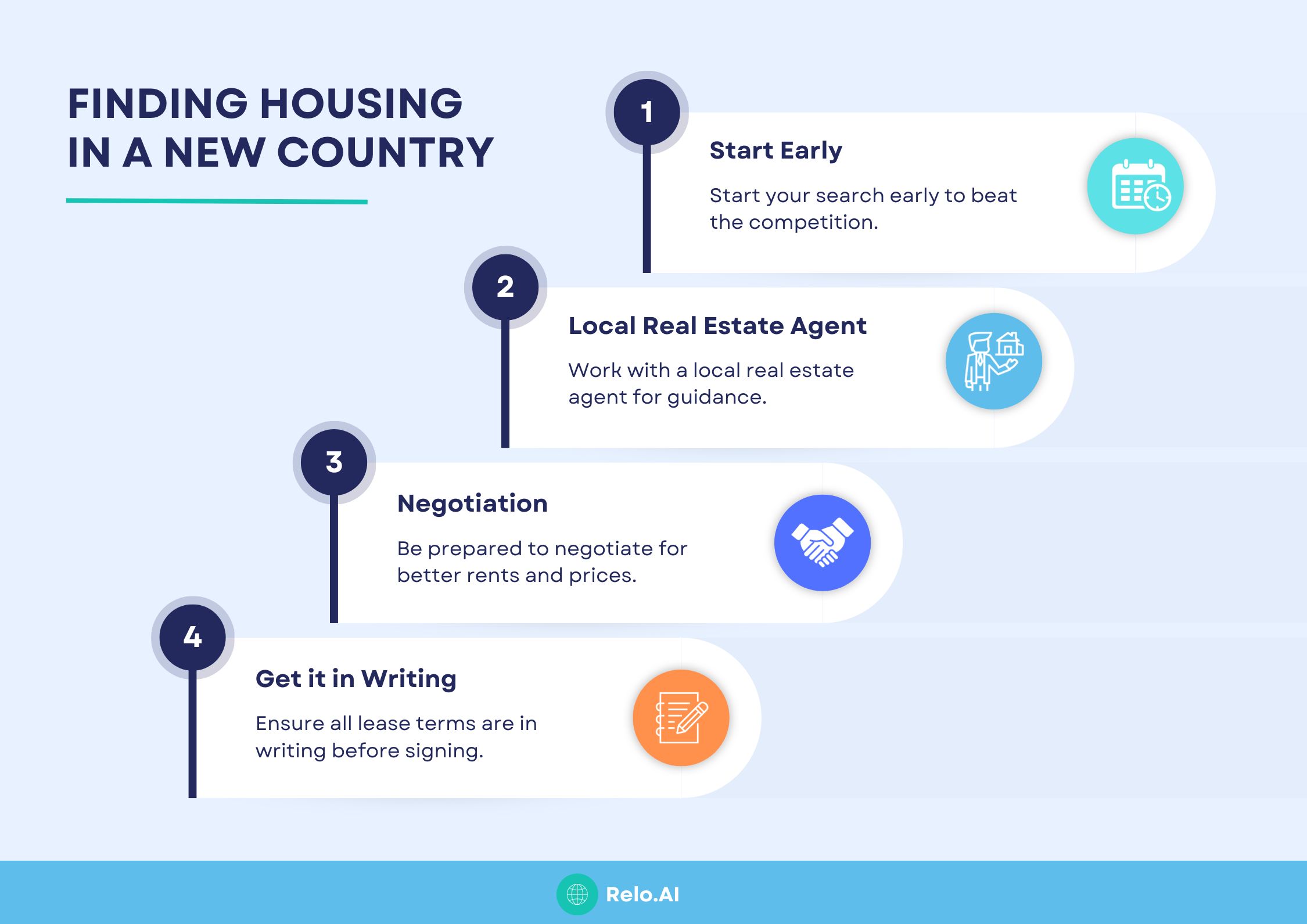Embarking on an international relocation journey can be as exciting as it is challenging. It is a process that demands careful planning, awareness of international protocols, and openness to new cultures and experiences. Learn with us the important aspects of relocating abroad, from legal preparations to cultural adaptation.
This journey not only signifies a physical move but also represents a significant life transition, involving emotional, professional, and social changes. Our post aims to equip you with the knowledge and tools needed to navigate this complex process, ensuring a smoother transition to your new home abroad.
The Basics of International Relocation
International relocation involves relocating to a different country for an extended period, often due to reasons like career opportunities, education, or personal growth. The first step in this process is extensive research. Comprehending the visa requirements, job market, living costs, and cultural landscape of your chosen destination is crucial. Such knowledge ensures a smoother transition.
The International Organization for Migration (IOM) recently found out that around 274 million people, or 3.6% of everyone in the world, have moved to a different country. It really shows how common it’s becoming for people to live and work in new, exciting places, actively searching for other opportunities and life-changing experiences far from where they originally came from.
Preparing for the Move
Legalities and documentation are the cornerstones of international relocation. Ensuring your documents, such as passports, birth certificates, driver’s licenses, and academic records, are up-to-date is essential. This includes securing the correct visas and work permits, perhaps with the assistance of a knowledgeable immigration lawyer for more complicated cases.
Financial planning is equally important. Budgeting for the move should include upfront costs like shipping and travel, as well as understanding the cost of living in your new home. It’s also crucial to manage international banking needs, such as opening a bank account in a new country and understanding international taxation laws to avoid legal complications.
Housing and Accommodation
Finding the right place to live is a pivotal part of settling in a new country. Research the local real estate market to understand whether renting or buying suits your situation best. Consider short-term accommodation options like serviced apartments as a temporary solution while you get your bearings. When it comes to housing options, you have two primary choices: renting vs. buying.
Renting is a suitable choice if you’re on a tight budget or uncertain about your duration in the country, as it avoids the hassles of homeownership like property taxes and maintenance. In the long run, renting can be more expensive since you won’t build equity in a property. On the other hand, buying a home is a significant investment and a way to build wealth, especially if you plan to stay in the country long-term.
Here are some crucial steps in finding housing in a new country:

Cultural Adaptation
Adapting to a new culture during international relocation is essential for a successful transition. Engage with local communities, learn basic phrases of the local language, and be open to new experiences. Attend cultural events, join clubs, and volunteer to gain insights and make friends. Approach cultural differences with sensitivity, seek guidance from expat communities and embrace local customs and traditions.
This gradual process enriches your experience and fosters a deeper appreciation for diverse cultures. Remember that cultural adaptation takes time, so be patient and give yourself the necessary space to learn and grow within your new cultural environment. Embracing these challenges can lead to significant personal growth and a more fulfilling international experience.
Educational and Career Opportunities
When embarking on international relocation, it’s crucial to consider the educational and career relocation that awaits you in your new and diverse destination. Thorough research and proactive planning will help you make the most of these opportunities and ensure a successful transition.
An in-depth look at how to navigate these essential aspects:
For Families with Children
Research the local educational system, including schools, curricula, and language of instruction. Seek information on extracurricular activities and engage with the expat community for insights and recommendations. Visiting schools in person and attending parent-teacher meetings can provide a firsthand understanding of the education your children will receive in the new country.
For Professionals
Explore job opportunities and industry demands in the new country. Network with local professionals, attend industry events, and adapt your resume to local norms and expectations. Ensure your qualifications are recognized, and be open to obtaining necessary certifications or licenses. Thorough research and active engagement will significantly enhance your prospects for success abroad.

Also read: Insider Tips for Managing an Effective Corporate Relocation Program
Health and Insurance
Ensuring you have proper health insurance is a critical step when you’re thinking about relocating to a new country. The healthcare system in your destination might differ significantly from what you’re used to, so having the right coverage is essential for your peace of mind and financial security. International health insurance covers a wide range of medical expenses, including hospital stays, doctor visits, prescriptions, and emergency evacuations.
It can also include essential preventive care like regular checkups and vaccinations to keep you healthy. When choosing an international health insurance plan, it’s crucial to tailor it to your specific needs, preferences, and budget. Check if the plan comprehensively covers the types of medical care you’re likely to require and if it has a reliable network of healthcare providers in your new country.
Here are a few suggestions to help you secure the right health insurance when relocating internationally:
- Compare insurance plans from multiple providers to find the one that offers the best combination of coverage and cost.
- Thoroughly read and understand the terms and conditions of the policy before signing up.
- Consider choosing a plan with a higher deductible, which can lower your monthly premiums.
- Think about adding supplemental coverage for services like dental and vision care to ensure comprehensive healthcare coverage.

Relocating Logistics
Selecting a reputable international relocating company is the foundation of a stress-free move. Consider factors such as experience, reviews, and credentials when making your choice. One excellent option is Relo.AI, known for its expertise in handling international moves.
Packing Strategy
Efficient packing is critical to a successful relocation. It not only saves time and effort but also helps ensure that your belongings arrive at your new destination intact and organized.
Here’s an example illustrating a packing checklist:
| Packing Checklist | Details | Packing Checklist |
| Essential Documents | Passports, visas, medical records, etc. | Essential Documents |
| Clothing | Season-appropriate clothing | Clothing |
| Personal Items | Toiletries, medications, valuables | Personal Items |
| Household Goods | Furniture, appliances, electronics | Household Goods |
| Sentimental Items | Photos, keepsakes, heirlooms | Sentimental Items |
| Important Contacts and Addresses | Emergency contacts, new address, etc. | Important Contacts and Addresses |
Deciding What to Take
Deciding what to take with you is a crucial step in the process. It requires thoughtful consideration to ensure a smooth transition to your new home.
Consider the following:
- Essential Items: Prioritize items you can’t do without in your new home.
- Cost vs. Value: Evaluate the cost of shipping vs. replacing certain belongings.
- Customs and Regulations: Be aware of what can and cannot be imported into your destination country.
- Cultural Sensitivity: Consider cultural norms when packing; some items may be inappropriate or unnecessary in your new context.
Customs and Import Regulations
Familiarize yourself with the customs and import regulations of your new country to ensure a smooth transition and avoid potential issues during the relocation process. Understanding these rules will help you efficiently manage the logistics of relocating personal and household items across borders.
Here’s an example table summarizing key points:
| Customs and Import Regulations | Details |
| Restricted Items | Firearms, certain medications, controlled substances |
| Prohibited Items | Narcotics, hazardous materials, counterfeit goods |
| Import Duties | Taxation on imported goods |
| Documentation Required | Inventory list, customs declarations, permits |
By understanding and complying with these regulations, you can avoid complications and delays during the customs clearance process.
Pet Relocation Option
Relocating with pets adds another layer of complexity to your international move. Research the pet import regulations of the destination country, including vaccinations, quarantine requirements, and necessary health certifications. Explore comprehensive and tailored options for pet insurance to safeguard your furry family members during the transition.
Consider the services of a pet relocation specialist to navigate these requirements and ensure the safe and stress-free travel of your animal companions. Think about your pet’s adaptation to the new environment, including finding pet-friendly housing, local veterinarians, and pet care services: research pet training and behavior resources to help your pets adjust to their new surroundings seamlessly.
Building a Support Network
International relocating can be a transformative yet challenging experience that often comes with moments of isolation. It’s crucial to establish a strong support network to help you navigate this journey successfully and with greater ease. This network offers practical and emotional support during your transition to a new country.
Here’s how you can go about it:
- Connect with Expat Communities: Seek out expat communities in your new country. They can provide valuable insights, advice, and a sense of belonging. Attend expat meetups, forums, or events to make connections.
- Join Local Clubs or Groups: Find local clubs or interest-based groups that align with your hobbies or passions. Whether it’s a sports team, a book club, or a hobby enthusiasts’ group, these communities offer opportunities to meet like-minded individuals.
- Utilize Social Media: Social media platforms can be powerful tools for connecting with people in similar situations. Join expat groups on platforms like Facebook, Instagram, or LinkedIn. These communities often share tips, experiences, and support.
- Engage in Language Classes: If you’re in a foreign-speaking country, consider enrolling in language classes. Not only will you learn the local language, but you’ll also have the chance to interact with fellow learners and build connections.

Recommended read: Seamless Moves Made Simple: Exploring Domestic Relocation Services
Legal and Governmental Procedures
Familiarize yourself with the legal system and governmental procedures of your new country. It includes understanding your rights and responsibilities as an expat, registering with local authorities, adhering to local laws and regulations, ensuring your legal documents are up-to-date, and having a contingency plan in case of legal emergencies.
Stay informed about any political situations or changes in legislation that could affect your stay. Consider seeking legal counsel or guidance to ensure full compliance with the legal framework in your new home. Establish a reliable network of local contacts who can provide assistance and insights into navigating legal and governmental matters.
Countdown to Relocating Day
Embarking on an international move requires meticulous planning and organization. This structured countdown ensures you cover all necessary preparations from one month to one week before your big day. Stay on track with these critical milestones, alleviating last-minute pressures and setting the stage for a successful transition.
Follow these steps to make your relocation process as smooth and stress-free as possible.
One Month Before Relocating
- Begin sorting and organizing your belongings. Decide what to take, sell, donate, or discard.
- Start researching and contacting international relocating companies. Obtain quotes and check their credentials and reviews.
- Notify your landlord (if renting) or real estate agent about your relocating date.
- Schedule medical and dental checkups to ensure health records are current. Also, request copies of these records to take with you.
Two Weeks Before Relocating
- Secure and photocopy essential documents like your passport and ID. Leave a set with a trusted relative or friend as a backup.
- Pick up laundry, return library books, cancel subscriptions, and update your postal address.
- Sort through your belongings, donating or giving away items you won’t be taking with you.
- Complete any last-minute shopping for essentials you’ll need immediately upon arrival.
One Week Before Relocating
- Reconfirm arrangements with your international relocation company, airline, and any other relevant bookings.
- Prepare a small bag of valuable items to keep with you during the flight.
- Pack a first-night suitcase with essentials for each family member, including fresh linen, snacks, and a change of clothes.
- Set up a travel currency card to minimize foreign exchange and withdrawal fees.
International Relocation Simplified with Relo.AI ?
Relo.AI is your go-to expert for streamlining international relocations, offering seamless and worry-free transitions for professionals embarking on global career paths.
Ideal for individuals starting new roles abroad or companies aiming to enhance their international relocation strategies, our platform delivers customized support to meet diverse global needs.
Our comprehensive range of services includes:
- Tailored international relocation planning
- Global housing and accommodation solutions
- Specialized guidance for cultural integration
- Support with international education and schooling for families
- Assistance with career transitions across borders
We meticulously craft these services to address the unique challenges of international relocations, ensuring a responsible, efficient, and cost-effective process.
Eager to revamp your international relocation approach? Book a consultation today to discover how Relo.AI can transform your global mobility strategy. ?
Take the first step in your international relocation journey now by filling out our form. ?
Wrap it Up!
International relocation is a significant life event filled with opportunities and challenges. With preparation and openness, smoothly navigate this transition and start an exciting new life chapter. This journey provides a unique opportunity to broaden your horizons by directly experiencing diverse cultures and perspectives. Embrace this adventure for personal growth and a deeper world understanding.











